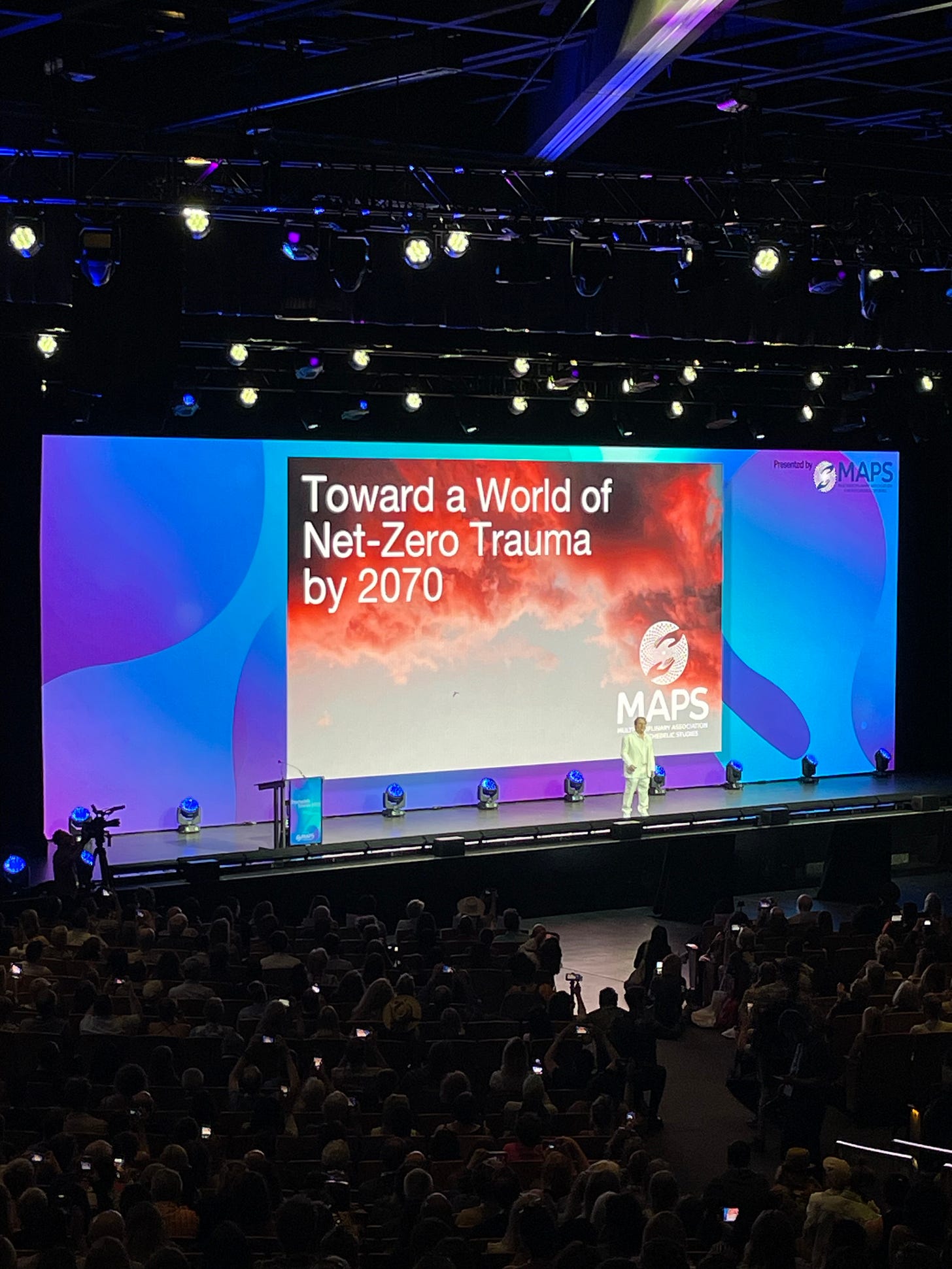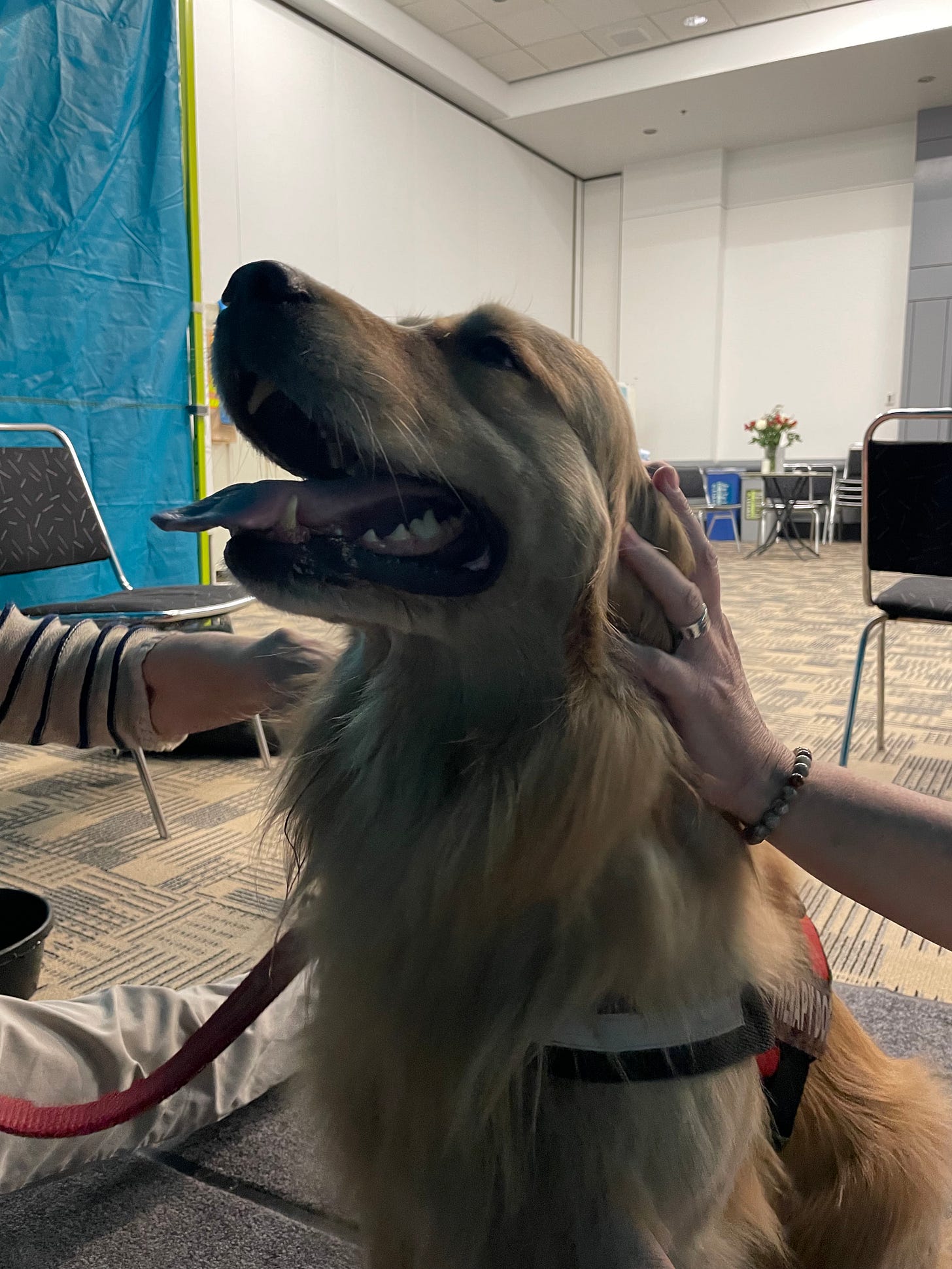Welcome back to The Microdose, an independent journalism newsletter brought to you by the U.C. Berkeley Center for the Science of Psychedelics. This week, we’ll be bringing you daily dispatches from the Psychedelic Science 2023 conference in Denver.
Question of the Day: Each day I’m asking conference attendees one question. The question today is “In one sentence, why are you here?”
Here’s a sampling of answers.
“I’m here for hope: a hope for healing for my clients, and for me.”
Michelle Landon, therapist, Fort Collins, CO
“I have a new podcast and I’m looking for partners.”
Jon Torn, The Scientist podcast, Globe, AZ
“I know how good it feels to get to the root of who you are, and I know people need this as well.”
Christopher Raschella, chiropractor, Somersworth, NH
Keynote: MAPS Board chair Vicky Dulai kicked off the first day of Psychedelic Science with a short address, calling the event, “the most prominent psychedelic conference in the world.” (It’s noteworthy that Dulai was the conference’s first speaker; the family of Holocaust survivor George Sarlo accused Dulai of financial elder abuse, and MAPS launched an investigation into those accusations.) Following Dulai’s address, local student Maya Padilla gave a land acknowledgment and urged the audience to be wary of companies pushing psychedelic “cures,” and then members of MAPS executive team Ismail Ali, Liana Gilooly, and Natalie Ginsberg appeared on stage together to set the tone for the meeting, encouraging attendees to hold space, be present, and drink water.
This was all build-up to the real headliner: MAPS founder Rick Doblin, who walked out on stage dressed in a white suit. The overflow audience of some 5,000 burst into a standing ovation before he’d said a word. Doblin wandered the stage like a preacher, describing his personal history with psychedelics and MAPS’ milestones over the years — his stage presence and slick slides made the event feel more like an Apple product launch than your typical conference keynote. Doblin’s influence is palpable everywhere here; there is an entire conference track dedicated to him. The audience was rapt, laughing at his jokes and liberally applauding. The woman sitting next to me wept through his entire talk.
Doblin devoted a solid chunk of his address to his vision for the future, which centers around the idea of “net-zero trauma,” and psychedelics’ role in healing people. “What we mean is not eliminating trauma — there’s always going to be trauma — but we want to stop adding to the burden of suffering,” he said. He presented the idea of “gross national trauma,” akin to the Bhutan government’s concept of “gross national happiness.” Doblin said he believed the FDA would approve MDMA by mid-2024, and once that happens, he said MAPS would bring treatment opportunities to communities and groups with the largest burden of trauma including migrants, victims of sexual assault, and survivors of war. “We’re going to need to use psychedelics for conflict resolution,” he said, mentioning recent work bringing Israelis and Palestinians using ayahuasca together.
Former Texas governor Rick Perry (R) took the stage after Doblin wearing a gray suit. “You got to see the white and the light in Rick Doblin, and I’m the dark, feet-dragging politician, the Republican from Texas,” he said. Perry said he found his way to psychedelics by trying to find treatment options to help Navy SEAL veteran Marcus Luttrell. On stage, he reenacted his reaction the first time he heard the word “psychedelics” in 2018. “Get away from me!” he yelped, jumping back a step and holding his index fingers in a “t,” to mimic a cross. Eventually, he said, he became convinced that psychedelics could help veterans and their families. At the end of his talk, he addressed the audience directly: “You’re literally changing the world, changing minds, and saving lives,” he said.
I grew up in Kentucky going to a Baptist church and while Doblin looked the part of a preacher in his white suit, Perry’s talk had the cadence and emotional impact of a sermon. It wasn't until the end of the talk that I realized Perry had revealed very little about his political positions. I was left wondering what Perry would say about other approaches to psychedelic use beyond potential mental health treatments, such as recreational use or churches dedicated to spiritual practices involving psychedelics.
Last up was Colorado governor Jared Polis (D), who immediately told the audience he wouldn’t be as exciting as Perry. Attendees seemed to take that to heart and left in droves as soon as Polis started discussing the challenging logistics of implementing Proposition 122, the state’s ballot initiative which made psilocybin state-legal. Polis said Prop 122 didn’t go far enough; he called on the state legislature to give him authority to issue a mass pardon for people convicted of psychedelics-related charges just as he did for people with marijuana charges back in 2021.
Subscribe! (It’s free!)
Panel on state and federal policy reforms
A thread throughout the panel was the comparison between cannabis and psychedelics reform. Attorney Matt Zorn said cannabis reform was mostly a failure, with federal reform lagging so far behind state-by-state policies that federal progress has stagnated. “If we are trying to reproduce cannabis reform for psychedelics, we’re going to have the same if not worse problems,” he said. Many have a misconception that advocating for federal reform is a “waste of time,” said Brett Waters, founder of psychedelics advocacy group Reason for Hope — but he said he believes that there are signs that federal officials recognize that they must take action.* (Reason for Hope is working with U.S. legislators on the Breakthrough Therapies Act, which could lead to the rescheduling of psychedelics.)
Lawyer Seema Sadanandan suggested finding unlikely allies to build momentum towards federal psychedelic reform by looking to other big political issues, such as gun control and crime. Victims of school shootings, COVID first responders, firefighters, and police officers could all be allies in supporting psychedelics, she said. Attorney Kathryn Tucker added an interesting example of a “strange bedfellow” for psychedelics advocates: in her work advocating for death with dignity laws, she said there were opponents of that work that might support psilocybin because it could make it less likely people would choose to end their own lives.
Panel on creating standards of care and accreditation for psychedelic practitioners
This panel was just half an hour, and touched on major tensions in credentialing and accreditation for people providing psychedelic services. “If we don’t create standards and guidelines ourselves, outside entities will step in to do it for us,” said NiCole Buchanan, Michigan State University professor and CEO of non-profit group Board of Psychedelic Medicine and Therapies. Panelists discussed the challenges of creating systems that cover all different types of practitioners. For instance, Oregon Psilocybin Services Section Leader Angie Allbee pointed out that the framework in Oregon credentials trainees to provide non-medical, non-clinical and non-directive psychedelic support, which is different from serving as a guide or therapist who might use directed questions with clients.
The panel also discussed tensions in credentialing experienced practitioners who have operated in the illegal underground for years. “Don’t put your experience in a Google doc,” said ketamine researcher Raquel Bennett. “You cannot document previous experience providing support without that constituting a felony.” Even if credentialing issues are resolved at the state level, FDA approval could lead to federal directives that would supersede other credentialing systems, said Scott Shannon, associate professor at Colorado State University. (For more on those directives, read our 5 Questions for bioethicist Amy McGuire.)
The conference vibe
Like the psychedelics field itself, the mood and aesthetics here are eclectic. I’m accustomed to science and journalism conferences, where people wear science-themed prints, but PS2023 attendees are taking it to another level. My favorites: a shirt that read “VIBRATING ON A HIGHER FREQUENCY”; a hat resembling amanita muscaria mushroom; and someone in a sparkly dragon costume rollerblading outside the exhibition hall. I have not seen so many fedoras in one place since the early 2010s. I used Shazam to look up the songs playing before a panel, which included a Welsh harpist and a Senegalese singer-songwriter.
I asked a bored-looking security guard what he thought of the crowd and he told me PS2023 reminded him of two other events he’d worked at the conference center: ComiCon and Pride Fest. “It’s people wearing their best costumes and expressing themselves,” he said. I noticed two cops strolling around the convention center and asked if the conference’s topic raised hackles for law enforcement, but they assured me it’s their normal policy to patrol the event space. I asked them if anything about the crowd stood out to them. “We’ve seen weirder,” they said.
I’ve been surprised — and pleased — by the number of dogs here. There is, in fact, an entire “Calming Canine Corner,” where I spent a few minutes petting a dog named Ruffwater Let’s Get Ready to Rumble, or Rumble for short.
Last up: NFL’s Aaron Rodgers!
Just the fact that Aaron Rodgers was giving a talk here made the news. For an hour, Rodgers and podcaster Aubrey Marcus told stories about their personal trips and psychedelic revelations. Rodgers said he started asking himself big questions about the point of his life and career after winning the Super Bowl in 2011. After trying ayahuasca before COVID, and then winning back-to-back NFL MVP awards in 2020 and 2021, Rodgers decided to go public about his trips. “I knew they couldn’t cancel me,” he said.
“What you say and do today matters; we’re all in this thing together,” Marcus said. The two talked extensively about self-love and psychedelics’ potential to heal society. And yet in their conversation, they often co-opted terms describing marginalized communities’ struggles, including “come out of the closet” and “underground railroad” to describe their journeys with psychedelics. I wondered who they meant by “we,” and whether their psychedelics-inspired choices really engendered communal healing. Marcus told a story about having Robert F. Kennedy Jr. on his podcast and then having a ketamine experience that convinced him to back Kennedy in his 2024 presidential bid. Kennedy is a staunch anti-vaccine conspiracy theorist, and Rodgers has been a vocal opponent of COVID-19 vaccination as well.
Have a great day — we’ll be back in your inbox tomorrow with more from the conference.
If you know anyone who might like the latest on psychedelics in their inbox, feel free to forward this to them, or click below.
Got tips? Email us at themicrodose@berkeley.edu.
*Correction: We initially misquoted attorney Brett Waters about his views on federal reform. What he actually said is that after observing what's happened in the cannabis movement, it's a common misconception that seeking federal reform for psychedelics is "a waste of time," when in fact there have been promising steps at the federal level. The post has been corrected. We regret the error.










Yesterday I received an email that was an open letter about the MAPS conference and the elephant in the room that is how expensive it is to go on the conference. The keynote speaker said this. "You're literally changing the world, changing minds and changing the world". The speaker missed out an important piece of information. "And if we do it right we can make a ton of money". If you are a true shaman, a mystic or a real healer you would not dare charge a penny for your services. How does that fit into your plan to heal the world?
I have no idea why the grouse about the need for an editor. I thought the piece was excellent (and very well written) from start to finish. Thanks for the coverage and commentary. It’s much appreciated.